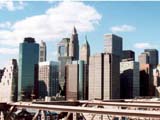|
Downtown
Manhattan, the Neighborhood it Was and the Neighborhood
it Still Is
By Helen Torres
Children's laughter, and concerts in the park; aspects
of life not expected from the capitalist financial district
of New York City. Nevertheless, these are the echoes
of things that were, and things that are again.
Downtown Manhattan is not just New York City's financial
district, it is a vibrant community. Before the towers
fell, downtown neighborhoods like Tribeca were becoming
the next Manhattan 'hotspots.' Renters and homebuyers
were moving to lower Manhattan, closer to their jobs,
and into a neighborhood that was becoming more family
friendly.
 The
attacks have changed the dynamics of the neighborhood,
however realtors remain optimistic about the rebuilding
of the downtown area, even in the face of some tough
odds. There is still a fear many people hold with going
downtown, many reminders of the tragic day linger in
the neighborhood with ground zero itself becoming a
tragic memorial to what once was. The attacks of September
11th of this year have resulted in speeding the country
into an economic slowdown. Massive layoffs and declining
consumer confidence have contributed to a fear that
the Manhattan private real estate market will be taking
a downward turn, as an already expected recession has
been exasperated. The
attacks have changed the dynamics of the neighborhood,
however realtors remain optimistic about the rebuilding
of the downtown area, even in the face of some tough
odds. There is still a fear many people hold with going
downtown, many reminders of the tragic day linger in
the neighborhood with ground zero itself becoming a
tragic memorial to what once was. The attacks of September
11th of this year have resulted in speeding the country
into an economic slowdown. Massive layoffs and declining
consumer confidence have contributed to a fear that
the Manhattan private real estate market will be taking
a downward turn, as an already expected recession has
been exasperated.
"Buyers are hesitant," reported Larry Sicular of Brown Harris and Stevens, "and some have backed out or re-negotiated previously negotiated transactions."
The immediate impact of the attacks was a loss of security
for New Yorkers. People did not feel safe in their own
homes, and in their careers. Over 25,000 people have
reported losing their jobs to the State Department of
Labor, as a result of the attack, pointing to a highly
unstable job market.
Annual bonuses, for corporate professions, which according to Corocon publications account for 6 to 7 percent of business, will be less than usual if they are rewarded at all as a result of the attacks. These bonuses were often spent as down payments for homes, or larger apartments. However, now more people are likely to save their money, feeling uncertain as to what the future holds.
In this type of atmosphere it is no wonder that the New York City real estate
is heading for some sort of decline. However, realtors
do not fear the end of the world when it comes to real
estate.
"Any type of change is good in this industry," said Anthony DeGrotta, a Manager and Associate Broker with Citi Habitats New York, "whether people are moving out or in we have something to do with it."
DeGrotta manages the office of Citi Habitat located
on 100 John Street, mere blocks away from where the
towers of the World Trade Center once stood. Most apartment
buildings that were in the vicinity did not sustain
any real structural damage. Phone lines and cable lines
have been rewired and repaired. The buildings look even
better than before, having been cleaned of soot and
debris.
 The
change in the neighborhood, according to DeGrotta, has
been more dramatic in the rental market than in the
homeowner market. There has been an increase in the
number of apartments available for rent, and as a result
rental prices have started to decrease. The
change in the neighborhood, according to DeGrotta, has
been more dramatic in the rental market than in the
homeowner market. There has been an increase in the
number of apartments available for rent, and as a result
rental prices have started to decrease.
Do people still want to live in a neighborhood where so much destruction has taken place? The World Trade Center was a mecca for this community. Events, stores, and trains that were in the Center were close and accessible.
"The World Trade Centers were a big part of this neighborhood,"
DeGratto agrees, "but we still have the South Street
Seaport and many businesses that were not destroyed."
People who live in other parts of Manhattan may not
find that rents are decreasing, but are in fact increasing.
Residents may be surprised to find out that a small
apartment in a building with no amenities, rents for
the same price as a 2-bedroom with full amenities, downtown.
More space, for less money, and no matter what state
the economy is in, people will always go for a bargain;
especially in Manhattan.
Though sales have nonetheless remained stagnant, at this point in time it would be cheaper to buy a home because of interest rate cuts.
Interest rates have reached their lowest point in year at 6.85%. According to HSH Associates, a leading financial publisher, compared to a year ago, loans are $157 less per month, and you can qualify for them with $6, 744 les income per year. The lower rates give more people a shot at qualifying for given levels of financing--and that means more people can borrow additional dollars.
Most brokers and analysts report that the real estate
market will handle the coming economic and political
problems in stride. Was this market affected by the
tragedy? Yes of course it was, for nothing in New York
has remained untouched from the attacks. However, this
does not mean that every person, family and company
will relocate to Long Island, or New Jersey.
Even the downtown area sustains a thriving neighborhood. Remaining residents are gradually trying to rebuild the community they once knew.
There is still South Street Seaport, Battery Park,
City Hall Park, Bowling Green, and many businesses.
Granted, many businesses were lost after the attack,
but 7 World Trade Center is expected to reopen in 2004,
offering 2 million square feet of retail space. Debates
on what shall become of the twin tower site are ongoing;
but there is no doubt that New York's financial district
will be restored. It will be restored with the high
skyscrapers that New York City is famous for. We have
no choice; so much commercial space was lost, Manhattan
is too small to build out wider, there is no more space,
the only place to go is up.
"They are pumping billions of dollars into this area, whenever you invest that
amount of time and money in a neighborhood it will thrive,"
said DeGratto. DeGratto, and other broker, have an optimistic
view of the market and the rebuilding of the neighborhood.
Come next year, it won't be the hot spot, and it will
take many years for the scars to fade from this neighborhood
and from this city. However, the reality is, people
need a place to live, why not downtown?
Have something to say? email
the author
Related Links:
New
York State Department of Labor
Citi
Habitats New York
HSH
Associates
South
Street Seaport
Brown
Harris and Stevens
Home | First
Wave | Undertow | Reflections
| Stepping Stones
| Weblogs
Contributors
| About Us | Archive
|

